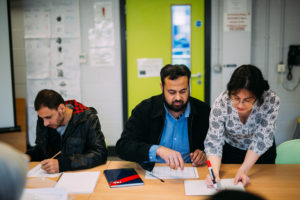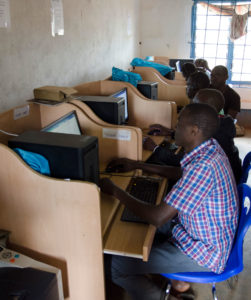Digital Inclusion in libraries
Jess shares our approach to digital inclusion happening in libraries across Australia, the UK and Kenya.
On the 14 February – Library Lovers Day – I had the pleasure of presenting at the Australian Libraries and Information Association (ALIA) Conference Information Online 2019. It was a great opportunity to share our global approach to digital inclusion with a focus on work that is happening in libraries across Australia, the UK and Kenya.
Good Things Foundation is a social change charity, and our vision is a world where everyone can benefit from digital. In the UK, we’ve already supported 2.5 million people to improve their digital skills, and as a group, we’re aiming to reach 3 million by 2020.
We established our office in Sydney in August 2017, and since then we have grown a national network of over 2,100 organisations who are supporting their communities to become digitally included. We’ve begun by working with older people, but we don’t believe anyone should be left behind as we know that there are many other groups of people who are missing out.
Although many of you may know of our work here in Australia and in the UK, what you may not know is that for over a year we have also been working on a project in Kenya. We are funding a pilot with the Kenyan National Library Service to test how digital inclusion can be embedded within libraries across the country.
Wherever we operate, our aim is to help people become digitally able, equal and active, and for them to be healthier, happier and better off. Our ambition is global, because there are 3.8 million people across the world who don’t use the internet – and these people are generally poorer, less educated and less resilient.
Wherever we work, libraries play a big role in supporting people to learn new digital skills. So, speaking at the National ALIA conference gave me the opportunity to work with my international colleagues to consider and compare digital inclusion work in libraries across the three countries.
In Australia, there are 2.5 million people who lack the digital skills they need as a result of three key areas identified by the Australian Digital Inclusion Index: access, affordability and ability. Our focus at Good Things Foundation is on supporting people to have the ability, the skills and confidence to engage actively in the digital world. We know that here in Australia there are other programs that have been supporting people to learn digital skills, like Australian Seniors Computer Clubs Association and Tech Savvy Seniors. And we know that many libraries have been involved in this work. So, it’s not surprising that libraries make up over 20% of the Be Connected Network, with over 480 libraries supporting older Australians to improve their digital skills. For example, libraries like Kingston Library are using innovative approaches to engage people in using technology for the first time.
Others, like Derrinallum Library, are using the opportunity to upskill their own staff and volunteers as well as library visitors.

In our UK network, there are almost 3,000 libraries helping people to increase their confidence and skills, to find work and move on to further learning, and at the same time reducing isolation. Like in Australia, the UK libraries are a trusted place in the community, especially for older people. However, they have struggled over recent years. Funding cuts have hit the sector hard, and some libraries are now community-run by unpaid volunteers. Like in Australia, digital skills support is just one thing that libraries offer – so library staff sometimes struggle with resources to deliver the amount of digital skills support they’d like to.
While I was in the UK in December 2018, I had the opportunity to meet with Clare from Rotherham Library and Jason from Leeds Libraries who use Good Things Foundation’s Learn My Way online learning resources to support people to learn basic digital skills. Both Clare and Jason are passionate about the work they are doing to improve digital inclusion through libraries and are trying to work structurally across Local Government to improve the opportunities for all people in their communities – because they know they can’t do it alone.

The challenges facing Kenyan libraries highlight some similarities, with some big differences too. Basic literacy and internet connectivity are big challenges in Kenya that create significant barriers to engaging people in digital skills. Some libraries, like Gilgil Library located three hours north of Nairobi, encourage people to come in the morning to use computers because the internet is more reliable at that time of day. Libraries are funded mostly by international charities, but people still have to pay to use them. This means that those who are most in need have no opportunity to access them.
Librarians in Kenya, like Mary in Kibera, are doing great work to support communities through mentoring and coaching support at the library. However, resources are tight and Mary often ends up paying for things using her own money. Until this project, there wasn’t any structured digital skills support offered (with the exception of ad hoc support) and in just one year they have supported over 1,000 people to learn digital skills. You can read more about our project in Kenya here.
What works well in libraries?
However and wherever digital inclusion work is happening in libraries, it is changing lives. By helping people discover digital, librarians and volunteers are helping people to be healthier, happier and better off. From our work across the world, we’ve looked at what makes digital inclusion work in libraries and unsurprisingly, it’s the passionate and supportive staff that rank number one across all three countries. If you pair this with friendly, accessible places that have a stable internet connection, you are off to a really good start. And where it works best there is support from the wider library service, along with adequate resources (whether people or digital tools), and digital skills support is a core part of the role – not just an add on.
With over 1,300 libraries in Australia, we’re keen to build the number of libraries in the Be Connected Network, and meeting all the interested people at the conference was a great way to do that. A big thanks to Sue McKerracher, CEO of ALIA, for hosting my session and your continued support of Good Things Foundation to engage libraries across the country.
If you’re a library that wants to do more or you’re working with libraries, then please get in touch.
